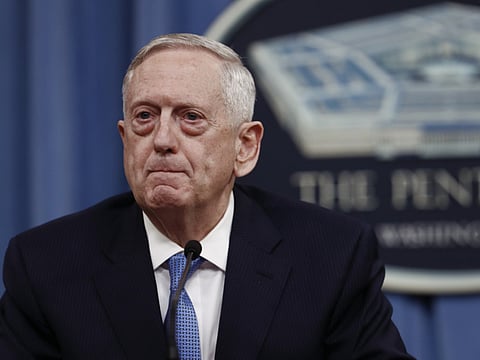Pentagon’s Mattis discussing war aims in Mideast this week
Defence secretary wants to expand US-led coalition against Daesh but also wants to boost efforts against Al Qaida

Washington: Defence Secretary Jim Mattis is looking to the Middle East and North Africa for broader contributions and new ideas to fight Islamist extremism as the Trump administration flushes out its counterterrorism strategy.
His trip to the region, which began with his departure on Monday night, includes stops with long-standing allies Saudi Arabia and Israel, and new partners like Djibouti.
As the administration enhances its efforts, Mattis has made a point of consulting counterparts around the world. His goals include expanding the American-led coalition against the Daesh group in Iraq and Syria, but also combating Al Qaida, whose Yemen branch is posing particular worry as it uses ungoverned spaces in the Arab world’s poorest country to plan attacks on the United States.
In announcing Mattis’s trip, the Pentagon said last week he would be discussing ways to “defeat extremist terror organisations.”
Mattis is starting his travels on Tuesday in Riyadh, where he is expected to meet senior Saudi leaders.
Saudi Arabia is leading a coalition that is fighting Iran-backed rebels in Yemen. The coalition’s air strikes began two years ago but haven’t driven the Al Houthi rebels from the capital and large parts of Yemen they still control.
The Trump administration is considering providing intelligence, aerial refuelling and other military assistance to Gulf countries.
Worries about Daesh aren’t limited to Syria and Iraq. Its influence has spread to Libya and elsewhere in North Africa. Mattis told a Pentagon news conference last week that he hoped to bring as many other nations as possible into the administration’s new strategy, which involves diplomatic and other non-military features. He said that plan was still in “skeleton form,” though it was being “flushed out.”
The Middle East is familiar turf for Mattis, a Marine veteran of the Iraq war who rose to four-star rank. He finished his military career as head of Central Command, which directs US military operations across the Middle East and Central Asia.
On his weeklong trip, Mattis also is scheduled to visit Egypt and Qatar, which hosts the US military’s main Mideast air operations centre. It will be his first trip to these countries since taking office in January. He also will make a brief stop at Camp Lemonnier in Djibouti in the Horn of Africa, which the US uses to fly sensitive drone missions over Somalia and Yemen.
Mattis visited Iraq in February on his first trip to the Middle East as Pentagon chief.



